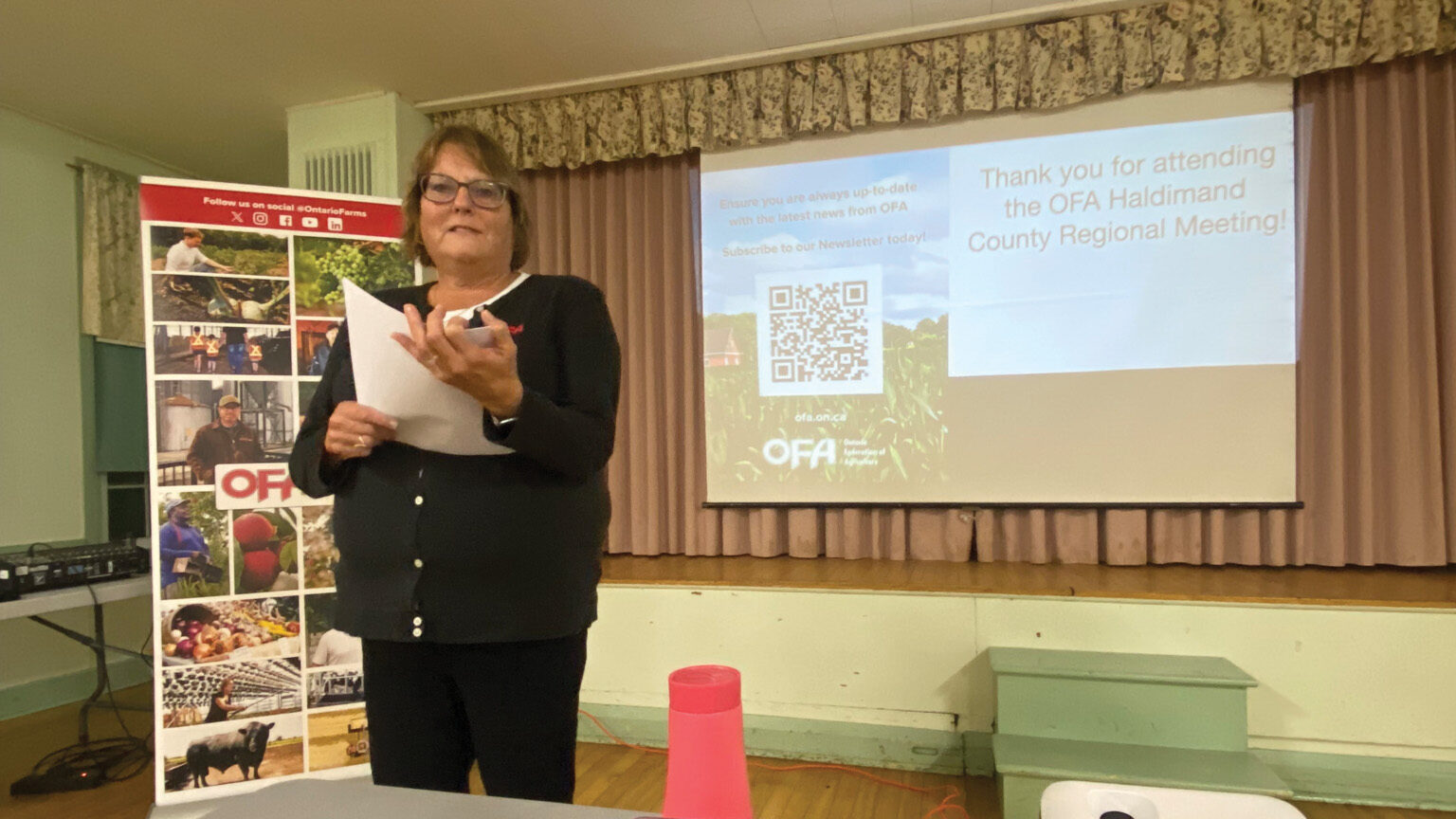HALDIMAND—Mayor Shelley Ann Bentley will stand before a judge to answer for her alleged contraventions of the Municipal Elections Act (MEA) in her campaign financial report following a second Audit Compliance Committee hearing on Friday, October 20, 2023.
The committee based their decision on several listed concerns, including:
- Failure to report all contributions and expenses;
- Accepting $5,000 in ineligible cash contributions that were not deposited into a campaign bank account; and
- The extent of the apparent non-compliance to the Municipal Elections Act.
“The committee believes that legal proceedings are warranted in light of the purposes of the Municipal Elections Act, including in particular, the importance of promoting transparency and accuracy of financial statements filed by candidates,” said Committee Board Chair Krista Russ.
The hearing began with a summary of the audit report from auditor William Molson, who noted it was quickly apparent in his work on the case that there were extensive unreported expenses: “What that means is the candidate expenses exceeded $10,000, which triggers the requirement for an audit…. There’s a significant issue here.”
While Molson praised Bentley for being cooperative and providing financial records on request, he noted, “There were a number of additional items which were not included in the return. Some came from bank statements.… Some were from a charge card which appeared to have a very dedicated use for the purpose of the campaign.”
Where there was a transaction seen that wasn’t provided in Bentley’s return, Molson asked her for clarification: “And in many cases, she said, ‘oh yes, that’s an oversight.’”
As previously reported in The Press, Molson ultimately concluded that Bentley’s listed expenses on her financial statement, totalling $9,889.69, was short by $7,926.36 for an actual campaign budget of $17,816.05.
Molson iterated that the mayor was made aware of the requirements and potential penalties in the MEA.
“The Act itself is not a difficult piece of legislation to read…. It’s short,” added Molson. “There’s a very low barrier of entry for a level of knowledge sufficient to comply with filing requirements.”
Since Bentley submitted her report more than a month before the final deadline, Molson asserted she had more than enough time for the required audit: “It’s not the case that the candidate ran out of time. Simply, the return is wrong.”
On the $5,000 in cash contributions that Bentley received, Molson noted, “They’ve got to go back. We don’t care who they’re from. They either go to the Clerk or they go back, because the Act does not allow contributions of that size to be accepted in cash.”
Molson said it was also unusual that those funds and any expenses paid with them were not run through Bentley’s campaign bank account, adding, “It’s the bank account that really becomes an incredibly valuable means of subsequently verifying what actually happened. By not running revenue through the bank as required, the candidate, perhaps unintentionally, fragments, scatters, all the available information.”
On Bentley’s controversial election signs, he stated, “It’s very difficult at a distance of 12 months to determine who put a sign in what place, who was responsible for, who made the decision, where were they produced…. That’s why the whole issue of whether the MZO signs were or were not part of the campaigns, I said I’m unable to conclude.”

Molson noted that since his report was issued and publicized, he has been approached by more than one person who claim they were personally given MZO signs by Bentley. Despite the new information, Molson did not recommend amending his report: “I don’t even know how you would audit it, frankly, unless by some extraordinary luck you found the sign supplier…. It’s not the intention of legislation to put an end to public debate. There’s a balance in there, a challenge.”
He noted that, even taking the signs off the table, Bentley was still well over the $10,000 spending limit that would trigger an audit, concluding, “The truth of the matter is … all it would have done is bump the expenses up.… It has no effect on my conclusions.”
Following Molson’s comments, the committee had a chance to ask questions.
Committee member Ron Kaufman asked Molson about the 50-plus unreported or incorrectly reported transactions in the mayor’s statement: “From your experience … is that an unusual number to have that volume of items?”
“Yes,” replied Molson. “There’s a principle that if you were coming in as an auditor, if you found that many transactions wrong, you’d have to seriously consider if its permissible to give an auditor’s opinion.”
Committee Chair Krista Russ asked Molson about Bentley’s use of a credit card throughout the campaign.
“A very large campaign can go out and get a credit card,” explained Molson. “It has been long recognized and accepted that a candidate or someone working on the campaign can use his/her credit card to pick up that paper at Staples or whatever, but they have to be promptly reimbursed…. Otherwise, it gets into the zone of being a loan, which is not permitted.”
Molson added that because Bentley did not promptly pay the expenses on her card, interest was charged, another apparent contravention of the MEA.
Next, audit applicant Lisa Richardson spoke. She addressed Bentley’s claims that her application was politically motivated and backed by Bentley’s political opponents, stating, “To set the record straight, my application was personally submitted and it was motivated by clear morals and ethics rooted in following the rules.”
She said the mayor’s response to the audit report, as submitted by her counsel John George Pappas, downplayed the contraventions by “choosing to highlight $100 breaches instead of addressing the overspending breach of $5,000 in unreported cash, missing a mandatory audit, and vast unreported expenses.”
Further, Richardson asserted that Bentley’s response tendered “legal advice that borders on intimidation towards the committee. I would respectfully ask that the committee not consider this advice, and that it is inconsistent for a committee auditor or prosecutor to receive advice from a subject in Canada.”
She concluded, “I feel the most concerning finding is Shelley Ann Bentley not completing a mandatory audit of her finances, which William Molson noted is a breach which carries a mandatory penalty. A mandatory penalty leaves very little, if any, room for discretion…. If there was ever a case to move forward with, this is the one. Your actions today will send a clear message to future candidates that failure to abide by the MEA carries serious consequences and it will reinforce the legitimacy of our elections and democracy to the electorate.”
Lastly, Pappas faced the committee, speaking on behalf of Bentley. See a full breakdown of Pappa’s submitted statement related to the audit by Press reporter Tara Lindemann, available here.
“The committee is playing a gatekeeping role. Fundamentally, it’s exercising discretion about what resources should be applied to deal with issues that have been identified in an auditor’s report,” said Pappas. “There are a number of factors the committee must consider in making its decision.”
He listed three factors:
- What a prosecutor might do with these matters
- What matters identified by the auditor are minor or trivial
- The important animating public principles that underlie campaign finance rules.
“The standard that is applicable to a prosecutor is proof beyond a reasonable doubt, which is substantially different than the standard which is applicable to an auditor, which is based on apparent contravention,” said Pappas. “There needs to be reasonable and probable grounds under the Provincial Offences Act to lay those charges. Someone has to swear under oath to the Justice of the Peace.… Beyond that, the prosecutor bears an ethical obligation at all stages through the prosecutorial process to continually ask themselves whether they have a reasonable prospect of securing the conviction.”
He questioned whether Bentley’s apparent contraventions constituted a severe enough issue to move forward with prosecution: “The committee should not authorize prosecution against a first-time candidate who’s made what the auditor has noted are conceptual errors in addition to a number of other errors. Doing so would not be in the public interest and it wouldn’t serve the important public policy that underlines the MEA.”
Committee member Frank Gelinas asked Pappas whether Bentley should be exempt from the rules laid out in the MEA.
“My submission is very clearly about what the outcome or impact of these contraventions are,” replied Pappas.
Gelinas followed up, “You say the candidate wasn’t particularly knowledgeable about financial issues and the complexities of running a campaign, but she was running to be the CEO of a billion-dollar corporation with over $200 million a year in revenues and expenses.”
Kaufman asked Pappas to clarify if Bentley had started returning funds from the undeclared $5,000 in cash contributions prior to the audit committee instructing her to. Pappas noted that Bentley has either paid back those funds or is actively working to pay them back.
Kaufman addressed Pappas, “In your report you go into quite a bit of detail over some of the specifics the auditor pointed out, but what I found a little odd … you made no comment about auditor item 5.4.1.8, and that was an additional Canada Post flyer delivery cost. You also didn’t note anything about 5.4.1.3, which is the bartered transaction for signs, which was valued at $1,600. Canada Post was $1,600. That’s $3,200. To me, that’s not trivial.”
Following Pappas’ comments, Molson responded, “The Act is very specific.… If you don’t file the stuff you’re supposed to, the candidate must forfeit their office and the office is vacant. This is something the Province of Ontario has mandated. This is the elephant in the room…. I would imagine it would be challenging to go a superior court judge and say ‘hi, we don’t want the law to apply’.”
Following the hearing’s conclusion, the committee deliberated for over an hour before returning with their decision. With prosecution moving forward, the next step for the committee will be to select a lawyer licensed through the Law Society of Ontario to “conduct the prosecution in a timely manner.”
It was not immediately apparent following the hearing whether Bentley will be permitted to remain in office and play an active role in Council activities while awaiting the next steps in the legal process, however County Customer Experience and Communication Supervisor Kyra Hayes provided a short statement on the matter: “From a corporate lens, I can confirm that Council will continue status quo until court proceedings are concluded.”
The Haldimand Press attempted to speak with Mayor Bentley following the hearing, and also sent a request via email for a response to the day’s events. No response was provided ahead of our publication deadline.
“The charges to be laid shall be those that are reasonable and on which probable grounds exist for believing an offence has been committed,” concluded Russ.





